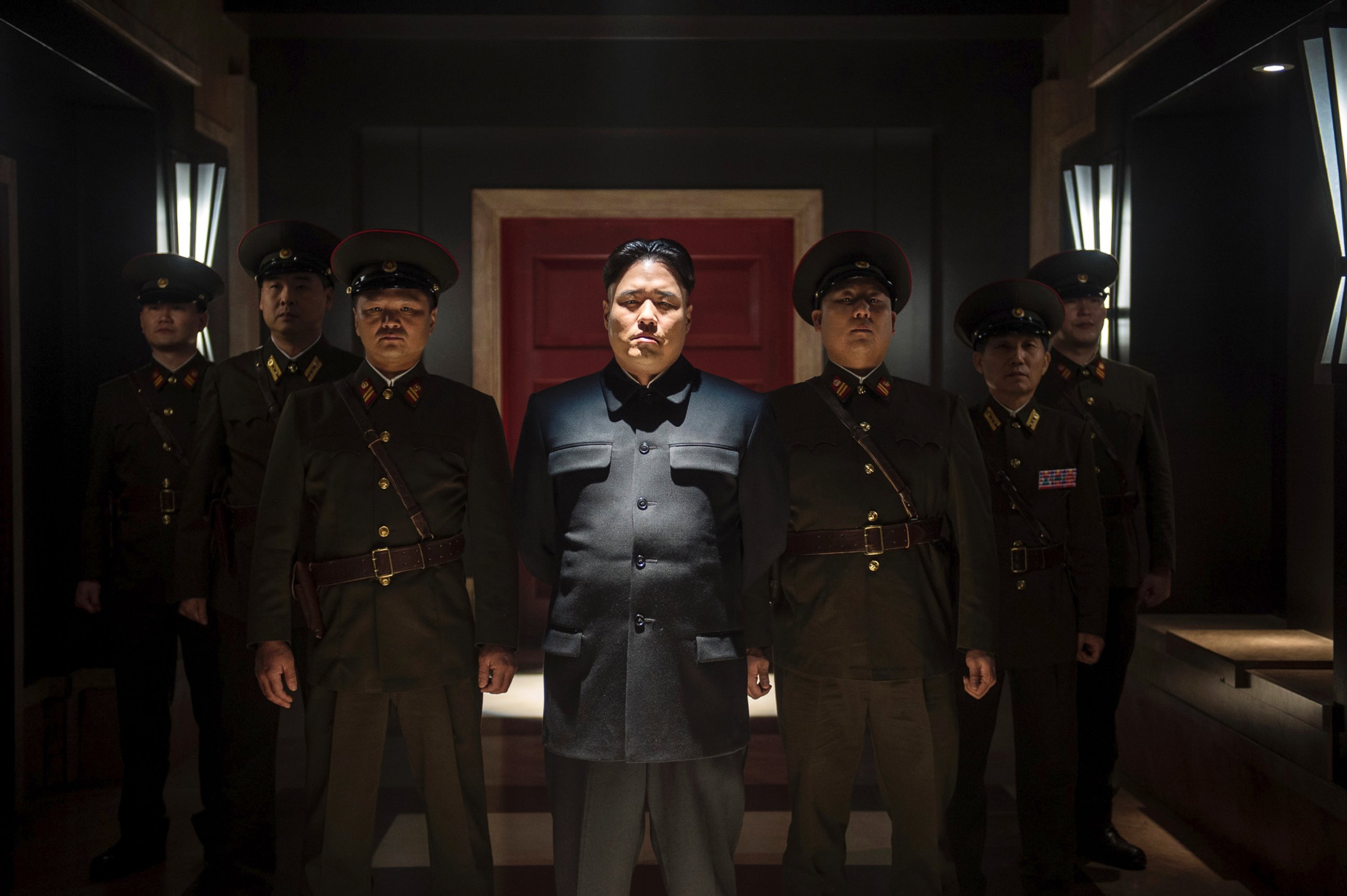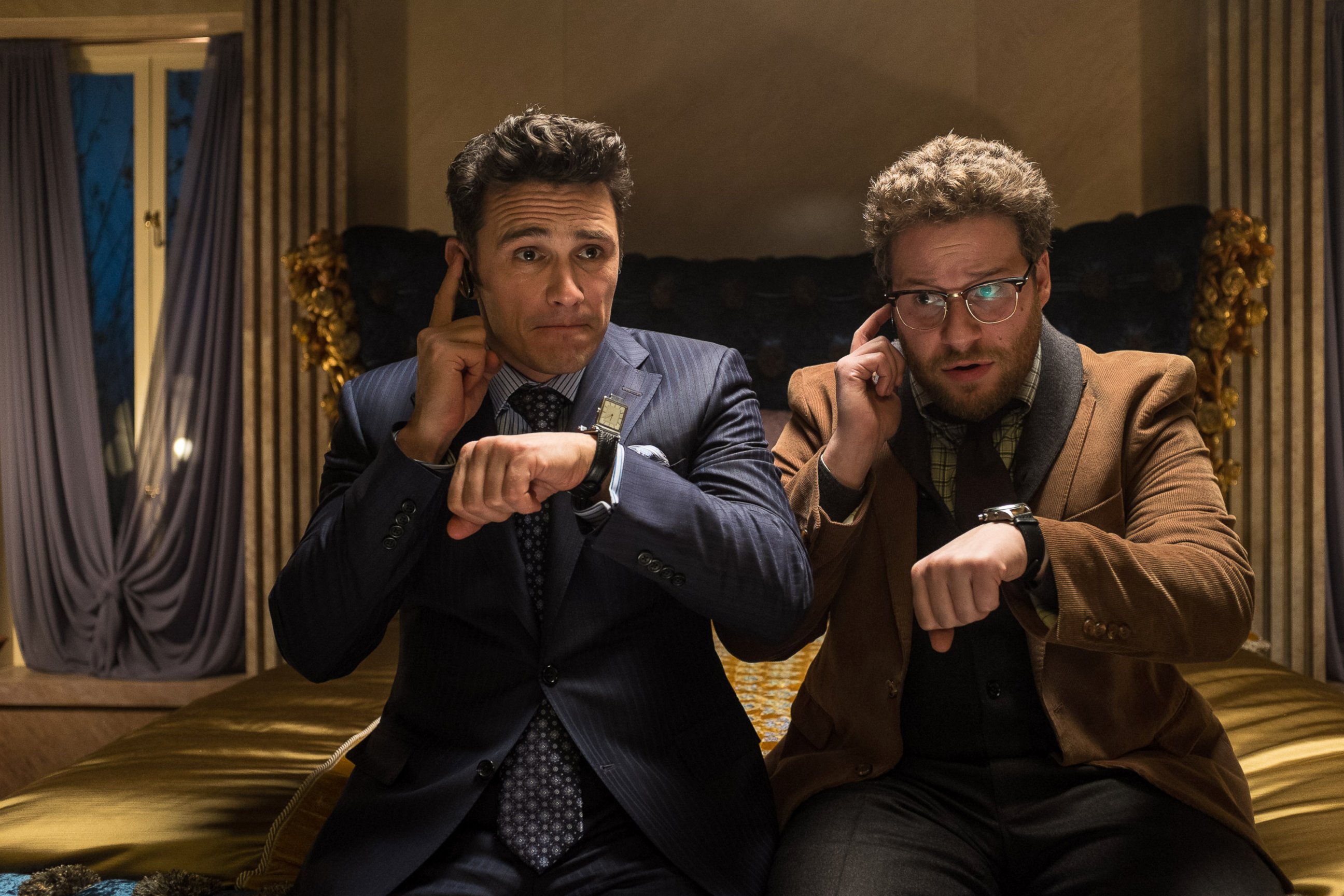'The Interview': Best Scenes From the Movie That Won't Be in Theaters
Inside 'The Interview,' the film that Sony has now pulled from public release.
— -- Even though Sony has announced that the controversial film depicting the fictitious assassination attempt of North Korean dictator Kim Jong-un will not be publicly released in light of cyber threats from a group that the State Department has now connected to the rogue regime, there are a number of industry insiders, reviewers and a handful of fans who were able to screen the film.
Several of those viewers spoke to ABC News today about their favorite scenes in the film and, while the chances are slim that it will be released publicly, consider this a warning that there are spoilers ahead.
Opening Scene Is "Comedy Gold"
Abraham Riesman, an editor at New York Magazine, said that while the film was largely "middlebrow comedy garbage," one of the funniest scenes is the opening, when James Franco's character Dave Skylark is interviewing the rapper Eminem on his celebrity talk show.
Skylark asks the rapper how he is able to use such violent language in his raps, and, Riesman said that the singer responds stone-faced, saying something along the lines of: "When I rap about women, that's because of problems I had with my mother. When I rap about gay people, that's because I'm gay."
Seth Rogen plays Skylark's producer, who tells Skylark to go back to the stunning revelation that was just made on live television, which Riesman said leads Eminem to say that he is surprised that it took people so long to figure out.
"He does it so straight, no pun intended," Riesman said of Eminem's delivery. "He has such incredible comic timing. I never would have expected."

Making Friends Through Canine Bribes
Both Riesman and Brett Arnold, the social media editor at Business Insider who saw the film after Rogen tweeted about a screening for fans in New York City last week, thought that one of the best parts of the movie came after Rogen's character, Aaron Rapaport, and Skylark arrive in North Korea to interview Kim Jong-un.
The dictator is played by Randall Park, who Riesman said is "easily the best performer in the movie," and he is an apparent super-fan of Skylark's, trying to win his favor as soon as the duo touches down in the forbidden land.
One funny storyline, Arnold said, is how the dictator gives Skylark an adorable puppy.
Arnold, who recounted much of the plot for Business Insider, said that not all is well for the pup, however, since it "is thrown into peril towards the end [but] it's all in good fun."
Aside from the canine bribe, Kim Jong-un tries to bond with the celebrity interviewer by playing basketball on the Dear Leader's private court, before being interrupted by a string of models and taking a tour of his collection of luxury cars, that includes a Soviet-era tank.
Opening Up With Katy Perry
When they get in the tank for a quick joyride, Riesman said that Katy Perry's hit song "Firework" starts playing on the stereo, and while Kim Jong-un quickly tries to dismiss it as something that his wife left after her last spin in the tank, Skylark confides that he loves the song as well.
The pair bond over the self-empowerment anthem, which becomes a theme in the film along with Jong-un's secret love of margaritas -- a fondness that his father disapproved of.
"That's one of the running gags also, even though [Kim Jong-un] plays all tough .. he gets choked up at 'Firework,'" New York Times culture reporter Dave Itzkoff told ABC News.

Franco Is No Oprah
Even though Skylark begins to get sucked into Kim Jong-un's apparent "brainwashing," as Arnold called it, Rapaport discovers that all is not as it seems when he goes into one of the North Korean grocery stores to find that the food is all fake and the people are suffering.
Then, rather than killing the dictator during their live interview, as the CIA asked him to do, Skylark becomes determined to both prove himself as a true journalist and topple the regime by making the stoic leader break down in tears during their interview.
Kim Jong-un is "basically trying to seduce him into believe that he's just kind of misunderstood," Itzkoff said.
"There's a perception that the dictator never cries, he never sheds a tear -- that as being sort of emblematic of the hold that he has on his country," Itzkoff said. "If they can just get him to cry on air in this interview then the hold he has on his country will collapse."
And what's the point of sensitivity that Franco's character decides to go after? Kim Jong-un's purportedly poor relationship with his father, and how he had told Skylark at one point in their bonding session that his father never felt his son was "man enough" to run North Korea.
Once Jong-un realizes that's what's happening in what was meant to be a light-hearted interview, the tables turn and hijinks ensue. Suffice to say, machine guns, bulletproof vests, anti-aircraft missiles and a helicopter appear in the subsequent scenes.
Justified Reaction?
Now, what is widely perceived as a romp of a comedy has led to an immeasurable loss for Sony after hackers broke into the company's private emails and personnel records, and issued a warning that any theater showing the film could lead to violent retribution, prompting the film to be withdrawn from release entirely.
"This isn't even the first movie of the last decade to show the assassination of the dictator of the country at the given time," Itzkoff noted, referring to "Team America: World Police," in which Kim Jong-un's father, Kim Jong-il, is the target.
"The whole tone of the movie is very broad and meant to be very silly, [but also] it's meant to make some substantive points about journalism, international politics and male friendship. ... It's meant to be absurd,” Itzkoff said.




